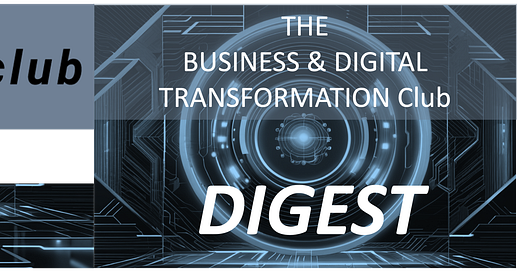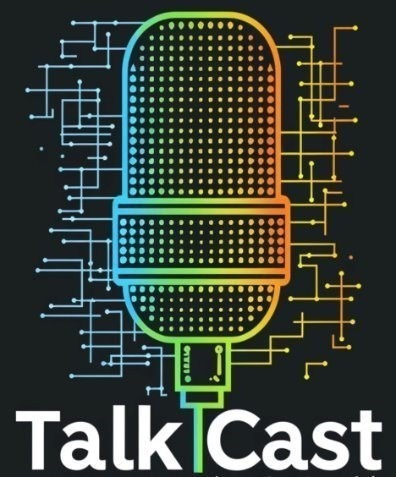New edition brings you a front-row seat to the world’s most pressing tech debates and disruptions.
News at a Glance
Microsoft × DeepSeek: Redmond bars employees from the Chinese AI app over data-security & content-integrity risks, highlighting a widening East-West AI trust divide.
Chip Controls Reversed: Trump scraps Biden’s sweeping AI-chip export rules, promising “simpler” safeguards—but the move clashes with his own tariff push and leaves industry watching for the fine print.
Soft Skills Take Center Stage: WEF 2025 shows analytical thinking, resilience & empathetic leadership outranking pure tech chops as automation accelerates.
Xiaomi’s “Dark Factory”: A lights-out, 24/7 production line (1 phone / sec) foreshadows fully automated EV plants—raising the bar for Europe’s carmakers.
Dive in the articles below and share your perspective.
Stay sharp, stay ahead of the curve!
Last month, the Business & Digital Transformation Club worked together with SingularityU, Axelera and the Energy Transition Club in an event that discussed what energy mix will truly fuel the AI revolution.
🎥 Now Online | "AI: What Energy Will Power This Revolution?"
Missed our event? Watch the full video 👉 https://lnkd.in/e82ubttJ
💡 Top Takeaways:
🔹 Data Centers will drive energy demand—location, emissions, and AI-led efficiency are key.
🔹 SMRs & Fusion offer long-term stability, with fusion still years away.
🔹 Nuclear + Renewables: A hybrid model where AI balances stability and sustainability.
🔹 AI as an enabler: Smarter energy forecasting, load management, and decision-making.
Disc: The discussion is in italian.
🛡️ Microsoft Bans DeepSeek App for Employees—What’s Behind the Move?
After Microsoft’s public ban on the DeepSeek AI app in early May 2025, the tech world has been grappling with the broader implications of this move—both for AI adoption and global digital trust.
Microsoft’s leadership cited two main concerns: data security and information integrity. DeepSeek, a Chinese AI platform, stores user data on servers in China, making it accessible under Chinese law and raising fears about government surveillance and potential misuse of sensitive information. Additionally, Microsoft pointed to the risk of content manipulation, as DeepSeek’s outputs may be influenced by Chinese state censorship and propaganda.
This ban is part of a wider trend. Since DeepSeek’s explosive rise in early 2025, several U.S. states (including Texas and New York), federal agencies (like the Navy and Department of Commerce), and countries (such as Italy, Australia, and India) have either banned or restricted the app, mainly on government devices. Lawmakers in the U.S. have even proposed broader federal bans, citing national security threats and DeepSeek’s extensive data collection practices24.
The issue is further complicated by DeepSeek’s open-source model, which allows anyone to run the AI on their own servers—potentially bypassing some data risks, but not the concerns about biased or manipulated outputs. Microsoft, for example, briefly offered DeepSeek’s model on Azure after making undisclosed “safety” changes, highlighting the tension between leveraging innovative AI and maintaining strict security standards.
In the weeks since the ban, the conversation has shifted to the global implications:
Tech companies are under increasing pressure to audit and restrict third-party AI tools, especially those developed under authoritarian regimes6.
The move signals a growing divide in the global AI ecosystem, as Western firms and governments tighten controls on Chinese technology, raising the stakes for cross-border collaboration and compliance.
There’s also a new urgency around developing trusted, sovereign AI infrastructure that aligns with local laws and values.
No major policy reversals or new bans have been announced in the past month, but scrutiny of DeepSeek and other foreign AI tools continues to intensify. The Microsoft-DeepSeek episode has become a flashpoint in the debate over how to balance innovation, trust, and national security in the age of global AI.
References and Further Reading:
[1] Microsoft doesn't allow its employees to use China's Deepseek-President
Reuters | May 2025
[2] Microsoft employees are banned from using DeepSeek app, president says
Charles Rollert | Reuters | May 2025
[3] China’s DeepSeek releases update to AI model that sent US shares tumbling earlier this year
Shared story by Reuters |CNN | May 2025
🧩Trump Overturns Biden’s Sweeping AI Chip Export Controls: Industry and Policy at a Crossroads
The Trump administration has rescinded the Biden administration’s sweeping, complicated export controls on advanced AI chips, which were set to take effect in May 2025. Biden’s rules aimed to limit China’s technological progress by imposing a complex, three-tiered licensing regime on over 120 “middle” countries—restrictions that many in the tech industry and allied governments criticized as too broad, bureaucratic, and nearly impossible to enforce.
Major U.S. tech firms, including Microsoft, warned that these controls would not only fail to prevent China from acquiring advanced chips, but would also harm American business, global influence, and relationships with key partners. Microsoft argued that the rules risked pushing allies like India and Israel toward Chinese suppliers, weakening U.S. leadership in global AI infrastructure45171819. Industry leaders also pointed out that the rules would stifle innovation and limit the ability of U.S. companies to compete in fast-growing international markets.
Trump’s move to scrap the Biden rules—while promising a simpler, more targeted approach—has intensified the ongoing debate about how best to balance national security, global partnerships, and technological leadership in the AI and semiconductor sectors131316. The administration claims its new strategy will better protect U.S. interests while keeping American firms competitive worldwide.
This policy shift appears at odds with Trump’s broader protectionist stance, especially his push for high tariffs on foreign semiconductors and electronics8910. While tariffs are intended to boost domestic manufacturing and reduce reliance on foreign supply chains, rolling back export controls is meant to keep U.S. technology attractive and accessible to allies—a dual strategy that has left some industry observers questioning its long-term coherence and impact on the already strained semiconductor supply chain. In practice, these mixed signals have forced companies to rethink sourcing and investment strategies amid rising costs and persistent supply chain pressures10.
Ultimately, the reversal of the Biden export controls underscores a deep industry and policy debate: how to secure national interests and technological advantage without isolating the U.S. from global markets or undermining the very innovation and alliances needed to stay ahead in the AI race.
🔮 Soft Skills as Strategic Assets for the Future of Work
As automation and AI reshape global industries, soft skills have moved from “nice-to-have” to strategic imperatives. The Future of Jobs Report 2025 confirms that while technical proficiency in areas like AI, big data, and cybersecurity is growing in demand, the most consistently valued skills across roles are analytical thinking, resilience, adaptability, and leadership with social influence. [1] These human-centric capabilities form the foundation of agility, collaboration, and innovation — making them critical for business continuity and growth.
Soft Skills as the Future-Proof Differentiator
The new currency of leadership is not just what individuals achieve alone, but how effectively they elevate others. As Adam Grant emphasizes, the leaders of tomorrow are those who create collaborative excellence, not just individual results. In an age of constant disruption, agility—the ability to anticipate, adapt to, and lead change—has eclipsed traditional markers of talent like IQ or technical ability. [2]
Reframing Leadership and Talent Development
For executive decision-makers, this represents a call to action. Soft skills are no longer a supplement to digital transformation, they are its enabler. The skills gap most threatening organizational transformation today is not technical, but human: a shortfall in adaptable, emotionally intelligent, and ethically grounded professionals who can lead in ambiguity. [3] Moreover, as AI increasingly encroaches on analytical and procedural tasks, those with distinctly human capabilities — empathy, storytelling, critical thinking — will become the true competitive differentiators. [4]
Implications for Decision-Makers: Rethink Talent, Rewire Culture
Risks: Neglecting soft skill development breeds brittle teams, erodes trust, and limits the ability to pivot in volatile conditions.
Opportunities: Investing in "vital human skills" cultivates cultures of innovation, psychological safety, and cross-functional agility.
Trends: Adaptive organizations like ING Bank are already restructuring planning around soft skill-driven agility and team autonomy. [5]
From Compliance to Competitive Advantage
In a world where technology will continue to outperform humans at routine tasks, the defining edge for organizations is not how fast they code but how well they lead, communicate, adapt, and inspire. Soft skills are no longer complementary; they are central to innovation, strategy, and sustainable growth.
As business models evolve, are your leadership frameworks evolving with them or preserving yesterday’s logic in tomorrow’s marketplace?
References and Further Reading:
[1] [3] World Economic Forum. (2025). Future of Jobs Report 2025
[2] World Economic Forum. (2025). Adam Grant: Future Leaders Won’t Succeed Without This Key Trait
[4] Ashley, M. (2025). What If Soft Skills Are the Most Future-Proof Career Asset?. Forbes
[5] Di Fiore, A. (2018). Planning Doesn’t Have to Be the Enemy of Agile. Harvard Business Review
🏎️ Xiaomi’s 24/7 “Dark Factory” and Its Strategic Implications for Europe’s Automotive Sector
Xiaomi’s deployment of a fully automated “dark factory” marks a transformative shift in industrial manufacturing. Operating 24/7 without human labor, lighting, or downtime, the facility uses AI-driven platforms to autonomously manage the entire production lifecycle from raw materials to finished smartphones at a rate of one unit per second. [1] [2] This model signals a significant leap in efficiency, cost optimization, and production scalability.
What makes this development particularly relevant is Xiaomi’s ongoing expansion into electric vehicles (EVs), including a new automobile plant scheduled for completion in mid-2025. [3] The possibility of applying dark factory principles to EV manufacturing presents a disruptive innovation vector—especially as European automakers navigate declining profitability, tightening regulations, and rising competitive pressure from both U.S. and Chinese players. [4] [5]
Strategic Relevance
Xiaomi’s model represents more than automation, it’s a redefinition of industrial operations through AI, data integration, and system autonomy. The implications are broad:
Cost efficiency: Automation at this scale could recalibrate global cost structures, potentially narrowing the labor-cost gap between Asia and Europe.
Innovation leverage: Shifting human labor toward R&D and high-value tasks aligns with trends in advanced manufacturing and talent utilization.
Operational resilience: Continuous, self-optimizing production could mitigate risks associated with labor shortages, energy use, and supply chain volatility.
As global manufacturing paradigms evolve, the integration of AI-driven autonomy into core production processes presents both opportunity and urgency. The decisions made today — on investment, regulation, and innovation — will shape not only the competitiveness of individual firms but the resilience of entire industrial ecosystems.
References and Further Reading:
[1] Xiaomi’s Robot Factory Works 24/7 Without Lights, Breaks, or People, YourStory, April 2025
[2] Xiaomi Launches First Fully Automated Smartphone Factory, Supply Chain 24/7, July 2024
[3] Xiaomi's automobile plant expansion to be completed in mid-2025, report says, Reuters, October 2024
[4] John Elkann et Luca de Meo : « Le sort de l’industrie automobile européenne se joue cette année », Le Figaro, May 2025
[5] European Automotive Industry: What It Takes to Regain Competitiveness, McKinsey & Company, March 2025
Before we close this newsletter, don't forget to JOIN the BnDT Club new tools!
🎙️ BnDT TalkCast - Bite-sized insights of 10-15 minutes for transformation leaders who want to stay ahead in the rapidly evolving business landscape 👉
📊 BnDT Digital Transformation Potential Indicator (DTPI) - A platform to explore and delve into digitalization trends in the EU and their relative impact 👉 https://bit.ly/bndtclub-dtpi
Share your opinion and thoughts with us; send us a post or article, open a discussion, engage actively!
As a reminder, we value our readers’ input, and we aim to provide material that is relevant to your interests, concerns, and questions.
Let us know what you would like to read about next.
We will do our best to include it in the following publications.








